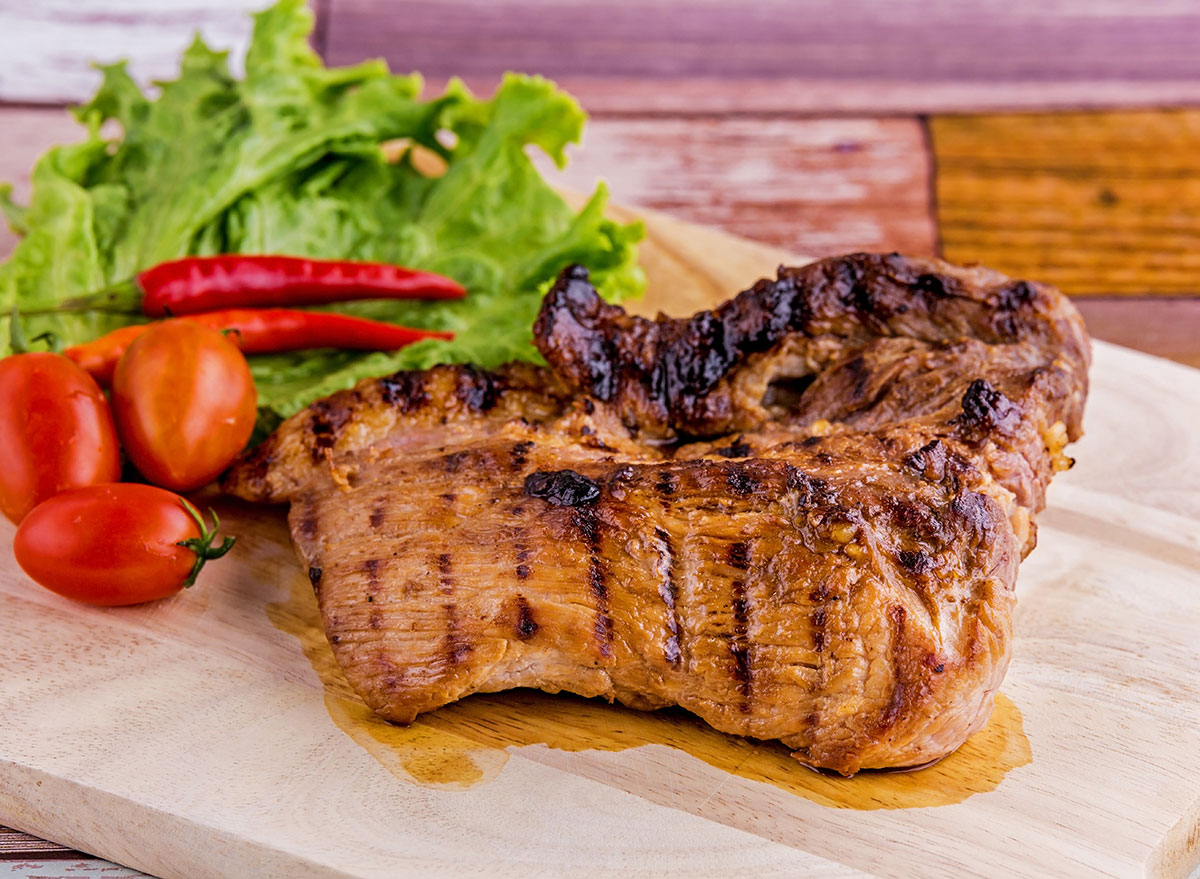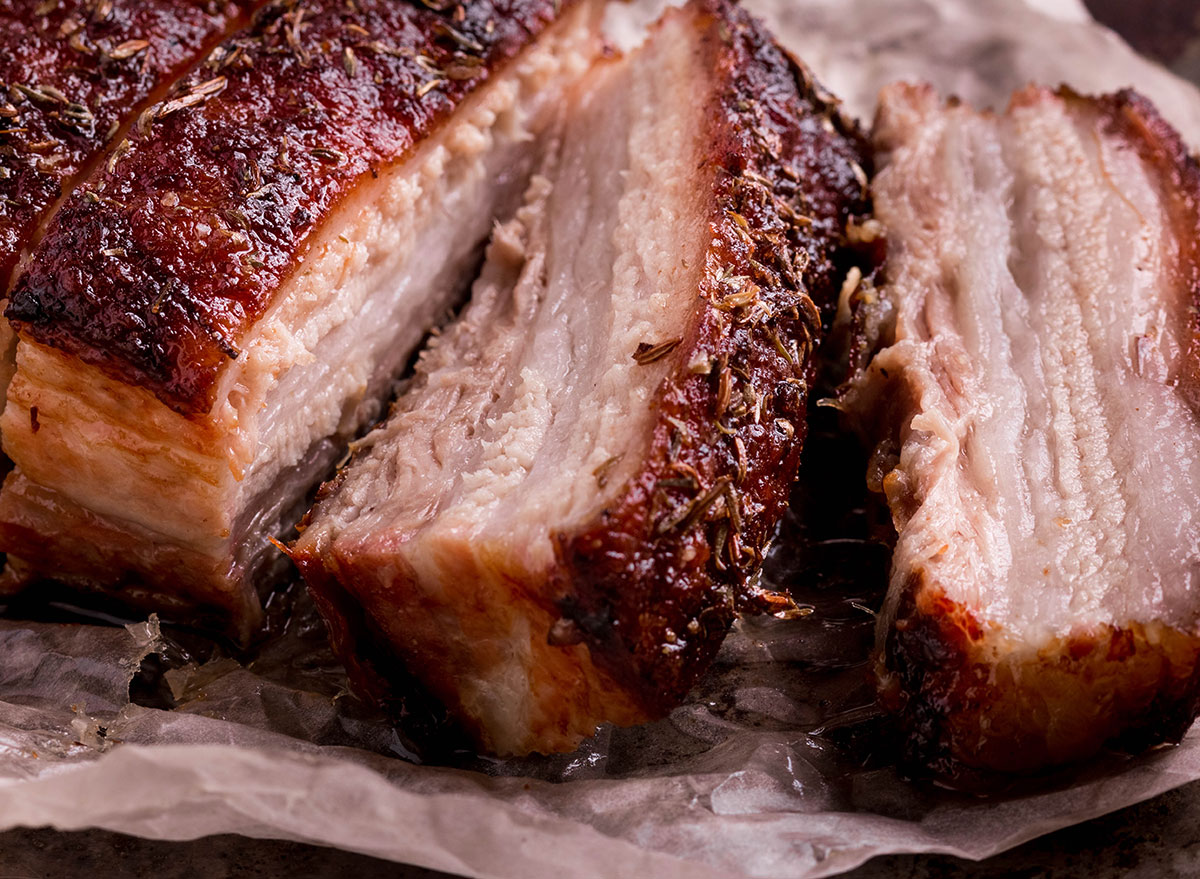What Happens To Your Body When You Eat Pork

Pork is controversial—devout Jews and Muslims are prohibited from eating it; others take issue with the ethics of the meat industry as a whole. Despite all of that, it’s one of the most consumed animals in the world. Even if eating pork isn’t against your beliefs, you might want to consider that from a nutrition perspective, pork has its pros and cons.
“Consuming high-quality, lean pork that has been prepared and cooked properly can lead to a few notable health benefits,” says registered dietitian Trista Best, RD, MPH, LD. Read this part again: properly cooked pork.
“Pork may be the most popular meat worldwide, but it can have serious implications for our health and immunity,” says Best. “Pork has a connection with cancer and heart disease.”
Like most red meat (yes, it is categorized as red meat) it can lead to cellular damage that, if allowed to persist, can replicate and lead to cancer and a poor immune response. Here are some things that happen when eating pork, and for even more healthy eating tips, be sure to check out our list of The 7 Healthiest Foods to Eat Right Now.
It can enhance muscle growth.

“Pork can be an excellent source of protein for those wanting to build muscle mass and increase their muscle performance,” says Best. “It is a complete protein, meaning it provides all amino acids including the 9 essential amino acids. However, it is important to reiterate the necessity for choosing high-quality lean pork as part of a muscle-building regimen.”
Pork also contains creatine and taurine; creatine plays a critical role in muscle growth and maintenance, whereas taurine is involved in the functioning of the muscles via its antioxidant power.
Here are 31 Delicious, Creative Ground Pork Recipes for Dinner.
You’ll increase your intake of micronutrients.

An overview of the average diets in the United States shows that micronutrients deficiencies are a health concern—partly because most of our diets are calorie-dense. Specifically, there’s a shortfall in the intake of vitamins and minerals, such as iron, and eating pork can help alleviate some of these deficiencies.
“Pork can be a source of iron and zinc in diets that are otherwise void of these nutrients,” says Best. “Minimally processed, lean, and properly cooked pork can be beneficial when consumed in moderation.”
It’s also a decent source of selenium, which plays a critical role in thyroid function.
It might increase your risk for cardiovascular diseases.

Pork contains a high amount of sodium—something we don’t need more of according to dietary surveys carried out in the United States showing that sodium is one of the most over-consumed “nutrients.”
Best points out that the most popular forms of pork are often high in sodium due to their processed nature—such as sausage, bacon, ham, and pork rinds. While sodium is a necessary part of anyone’s diet because it helps balance water levels, it is consumed at a dangerously high rate in Western diets.
Need an example? “Standard pork sausage contains about 400 milligrams of sodium per serving, which is around 20% of the daily recommended value,” says Best.
You should also be a little wary of the fat content of pork.
“Pork can be either lean or fatty, like most meats. When selecting a pork product—be it processed or a whole pork chop—the consumer should be aware of the quality of their pork and select leaner options,” says Best. “Saturated fat is damaging for heart health and can raise one’s risk of heart disease, stroke, and obesity.”
You could contract a parasitic infection (if you’re not careful).

As experts have emphasized, pork has to be properly cooked. Raw and undercooked pork is a major health concern.
“As with any animal protein, there is a risk for foodborne illness due to cross-contamination or improper cooking temperatures,” says Best. “Pork is unique in that it can contain a parasite known commonly as tapeworm, as well as the parasitic roundworm trichinella. Eating raw or undercooked pork can lead to serious and sometimes life-threatening parasitic infections.”
Looking for a unique (and safe!) way to prepare pork, check this recipe for air fryer pork chops!








